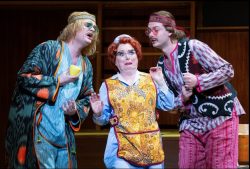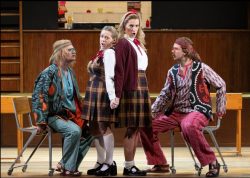 THERE are so many conspiracy theories about the composition of Cosi fan Tutte that they would make the basis of the plot for an opera in their own right.
THERE are so many conspiracy theories about the composition of Cosi fan Tutte that they would make the basis of the plot for an opera in their own right.
Was it the Emperor Joseph II, who died shortly after the first performance of the opera in 1790, who suggested the idea to Mozart, or since there are notes of an earlier edition started by Salieri, was he the first in the frame. Did Mozart deliberately fill Fiordiligi’s showpiece aria Come Scoglio, sung with lovely restrained passion here by Sophie Bevan, with leaps from low to high and back again, in order to embarrass soprano Adriana Ferrarese Del Bene, to whom he had taken a distinct dislike. Whatever the truth, the finished article, which has come in and out of fashion on more than one occasion, is now firmly established as one of the best comic operas in the repertoire.
The storyline of a tempter testing the fidelity of true lovers by one or the other disguising themselves in order to play the tempter, is a tried and tested idea that has been used successfully by ancient Greek playwrights, Shakespeare through to Ferenc Molnar in The Guardsman.
s
Blending his score to bring out the humour as well as the more serious themes in this storyline Mozart and his librettist Lorenzo de Ponte, produced an opera which has stood the test of time. If, as Director Max Hoehn and designer Jemima Robinson have done in this new production first seen in February of this year, you wish to make drastic changes to the setting, you have a great deal to live up to.
 Setting the story in a modern school with the four lovers Fiordiligi (Sophie Bevan), Kayleigh Decker providing a fine contrast of vocal and dramatic styles as her sister Dorabella, James Atkinson, a Jack-the-lad Guglielmo, and Edgar Zhuravskii’s far more vulnerable Ferrando, dressed as six formers, made the move into the temptation between four young adults look an uneasy one.
Setting the story in a modern school with the four lovers Fiordiligi (Sophie Bevan), Kayleigh Decker providing a fine contrast of vocal and dramatic styles as her sister Dorabella, James Atkinson, a Jack-the-lad Guglielmo, and Edgar Zhuravskii’s far more vulnerable Ferrando, dressed as six formers, made the move into the temptation between four young adults look an uneasy one.
The schoolboys suddenly join the navy, only to reappear to test their girlfriends, disguised as a couple of hippies, while the girls stay faithful to their school uniforms. All of this takes place at the instigation cynical school master Don Alfonso, sung and acted by Jose Fardiha with the air of a man who had seen it all before. He is aided and abetted by Rebecca Evans, chasing every last drop of humour as the school’s maid of all work, and disguised as a phony doctor.
Musically, the boys have to do battle in the first act with members of the WNO chorus surrounding them dressed as school children, rugby players and a girls gym class. Thanks to fine support from conductor Tomas Hanus and a WNO orchestra in its usual good form, they survive the intrusions, to take advantage of quieter waters in which to show off their vocal talents in Act 2.
 The girls also are seen and heard to better effect in the second act. That wonderful sly humour that can be heard throughout every bar of music does not develop to the same extent in this production. There are probably very significant reasons for the stage to be dressed with cardboard cutouts of classical statutes, large medical pictures of the inside of a brain, and later among the garish images in the school dressing rooms is a brief view of the lads’ urinal. But taken overall they tend to be intrusions, and apart from an initial giggle, do little to raise the level of humour on offer.
The girls also are seen and heard to better effect in the second act. That wonderful sly humour that can be heard throughout every bar of music does not develop to the same extent in this production. There are probably very significant reasons for the stage to be dressed with cardboard cutouts of classical statutes, large medical pictures of the inside of a brain, and later among the garish images in the school dressing rooms is a brief view of the lads’ urinal. But taken overall they tend to be intrusions, and apart from an initial giggle, do little to raise the level of humour on offer.
Hopefully as it beds in, the production will blend together to make a much more satisfactory whole, and become a better showcase for some very good vocal and dramatic performances.
GRP